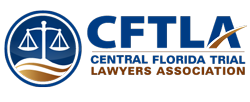Central Florida Brain Injury Lawyer
No matter how traumatic brain injuries occur, they can prevent victims from returning to work and cause significant impacts on victims’ lives.
If you or your loved one suffered a brain injury as the result of someone else’s negligence, recklessness, or intentional act, you may be entitled to compensation.
Victims may file a personal injury claim, which is a legal process through which victims may seek damages from responsible parties.
The compassionate Orlando brain injury lawyers at The Law Office of Jerry Jenkins know what you’re going through because we’ve helped many people just like you.
Call us now to see how we can help you.
What Is a Brain Injury?
A traumatic brain injury (TBI) is a disruption in brain functioning that is caused by an external force, such as a forceful blow or bump to the head. The brain is made up of several sections, known as lobes, which control nearly every part of your body by relaying signals through the spinal cord. The impacts that a brain-injured individual may incur as a result of their injury vary widely.
The impacts depend not only on the severity of the injury, but also the lobe in which the injury occurred. In addition, the side of the brain that was injured can determine the extent of the injury’s impact.
Below we look at the different lobes and sides of the brain, the functions they control, and the possible effects of injuries.
- Frontal lobe: The frontal lobe controls attention, concentration, self-monitoring, expressive language (speaking), personality, emotions, planning, judgment, and awareness of abilities and limitations. An injury to this part of the brain can result in difficulty controlling emotions, impulses, and behavior. In addition, it may cause difficulty in recalling events or speaking.
- Temporal lobe: The temporal lobe functions to control memory, receptive language (understanding what is said), sequencing, hearing, and organization. Injuries occurring in the temporal lobe often cause difficulties with memory and communication.
- Parietal lobe: The parietal lobes control the body’s sense of touch, depth perception, identification of shapes, sizes, and colors, and visual perception. Injuries to this part of the brain often affect the senses: sight, hearing, smell, taste, and touch.
- Occipital lobe: The occipital lobe’s primary function is to control vision. Injuries to this part of the brain may result in difficulty seeing and perceiving the shapes of objects.
- Cerebellum: The cerebellum provides control of functions such as balance and coordination, skilled motor activity, and perception. Those suffering injuries to the cerebellum will likely endure challenges in balance and coordination, as well as mobility.
- Brain stem: The brain stem controls the body’s involuntary functions that are necessary for survival such as breathing, arousal, consciousness, heart rate, and sleep and wake cycles. Suffering a brain stem injury is almost always catastrophic, causing victims to be unable to survive without mechanical assistance.
- Left brain: The left side of the brain controls the function of the right side of the body. It also controls the ability to analyze, organize, and literal thinking. Injuries to the left side of the brain can cause difficulty speaking as well as understanding language. Left-side injuries may result in impaired logic, sequencing difficulties, and catastrophic reactions such as depression or anxiety. Left brain injuries may also result in an inability to control movement on the right side of the body.
- Right brain: The right side of the brain controls the function of the left side of the body. It also controls creativity, imagination, empathy, and figurative thinking. In addition to making left side movements difficult, right brain injuries can result in visual-spatial impairment, deficits in visual memory, altered creativity and musical perception, and the loss of “big picture” thinking.
Brain injuries frequently cause complications, both immediately after the injury takes place, as well as additional complications months and years later.
Some of the common complications include:
- Fevers and infection: Infections are a common effect of a brain injury, as the body is no longer able to control bodily functions. Frequent sources of infection in brain injured individuals include the lungs (pneumonia) and the bladder. Fevers can be a sign of an infection or the result of another condition. Fevers may also be a result of damage to the brain’s ability to control body temperature.
- Blood clots: Blood clots are often the result of an injured person being immobile, but they can also be a consequence of the damage to the brain itself. Blood clots in the brain increase the likelihood of a stroke. Blood clots located elsewhere, such as the legs, can result in the clot breaking free and traveling through the bloodstream to the lungs. When a blood clot reaches the lungs, it can cause a potentially fatal condition known as a pulmonary embolism.
- Seizures: About 5 percent of all individuals suffering from brain injuries and about 50 percent of those suffering a penetrating brain injury will experience seizures. Those who experience a seizure within the first week after the injury are often prescribed anti-seizure medication. As a precaution, patients will remain on anti-seizure medications for six months to a year.
- Hydrocephalus: This term describes a buildup of fluid on the brain that can place pressure on the brain. Untreated pressure on the brain can cause significant damage. However, the condition may be treated through the surgical placement of a shunt.
- Heterotopic ossification: In about 10 to 20 percent of brain injury sufferers, extra bone develops in the body. The most common place for these bones to develop is in the large joints such as the hip or the shoulder. The condition causes pain and tightening in the area as well as swelling in the joint.
Common Causes of Brain Injuries
A police officer who was shot in the head during an on-duty incident was recently awarded a full disability pension from the Orlando Police Department. The pension provided will compensate him and his family for the rest of his life. The Pension Board determined the officer was eligible for a lifelong pension within mere minutes.
The officer suffered his injuries after responding to an incident involving a man holding a woman and her four children hostage. As the officer kicked open the door of the apartment, where the hostages were located, the suspect shot through the door, striking him in the head. The officer’s wife now serves as his guardian, as he is unable to communicate. As a result of his injuries, he is permanently and totally disabled.
Many traumatic brain injuries do not occur in the line of duty and, as such, are not eligible for disability pensions. That’s where a brain injury lawyer can help.
Many other things cause traumatic brain injuries, of course, and they happen all the time. TBIs are a major source of death and disability in the United States. Around 155 people die each day from injuries that involve damage to the brain. Brain injuries result in around 2.87 million emergency room visits each year.
Some of the most common causes of this type of injury include:
- Falls. Falls are the leading cause of traumatic brain injuries, accounting for nearly half of all TBIs suffered each year. Brain injuries caused by falls disproportionately affect children and older adults.
- Motor vehicle accidents. Motor vehicle crashes are the leading cause of brain injuries resulting in death for individuals ages 15 to 34 years old.
- Intentional harm. Violent acts such as gunshot or blast injuries for military personnel, physical assault, or to a baby that has been shaken are a common source of brain injuries.
- Being struck by an object. Being struck by or striking an object are frequently the source of brain injuries occurring at the workplace, especially in the construction industry.
- Sports injuries. Sports and recreation sometimes result in brain injuries in teens and young adults. Some well-known culprits of this type of injury include diving accidents and high-contact sports such as football or soccer.
The Impacts of Brain Injuries on Daily Life
The lifetime costs of medical treatment for a person suffering a traumatic brain injury are estimated to be between $85,000 to $3 million. Compounding this hardship is the fact that many individuals with brain injuries can’t return to work in the same capacity or to return to work at all.
The unemployment rate for brain injury victims two years after the injury is significant, estimated to be around 60 percent. Studies show that more than half of the homeless population in the United States have suffered some type of brain injury. It is safe to say that brain injuries impact every part of a victim’s life. Below we discuss some of those impacts.
At Home
For family members, the initial excitement of having their loved one home again after a stay in the hospital will likely be tempered by the new realities of daily life. After suffering a traumatic brain injury, victims frequently require extensive daily care.
Spouses and children often find that the relationship they had with their loved one transforms into a caregiver/patient relationship. Families likely must assume caregiver responsibilities, including assisting the injured person with daily tasks such as bathing, dressing, using the toilet, and eating. The family often suffers from a change in their routine and activities as their loved one can no longer care for themselves. Family members of victims often state they feel isolated from their friends, and lack empathetic support.
In A Relationship
Brain injuries can not only change the personality of the individual who has been injured, but also change his or her sexuality as well. Victims often suffer from a lack of sexual desire, the inability to perform sexually, or an altered sense of body image. Hormonal changes that typically affect victims of traumatic brain injury can drastically change their sexuality. In some cases, victims may engage in inappropriate sexual behavior or undergo a change in sexual preference.
At Work
While many people cannot return to any sort of employment after suffering a traumatic brain injury, others may perform some sort of work, but not the type of work they were tasked with before their injury. Of those who can return to the job they held before the injury, many require modified work schedules.
Workplace modification may include longer or more frequent breaks, as fatigue is a common complication from brain injuries. Additionally, brain injury sufferers may also require a lighter workload during the hours that they can work.
At School
Contrary to popular belief, children do not have a greater chance of recovery from brain injuries than adults. Instead, the severity of the deficits suffered by children may not be completely known or understood for many years. The impacts may only become apparent as the child continues to grow and develop.
Children who have suffered brain injuries often require assistance at school. Educational assistance may include hiring a paraprofessional who can help the child stay organized and provide assistance to the child in completing expected tasks. Also, children with TBIs often require extra time to complete tasks, oral examinations instead of written ones, and audio or video recordings of instruction.
Social Impacts
The friends of an individual suffering a brain injury often find that they have little in common with the person afterward. Due to the extreme changes that a brain injury can cause to someone’s personality, many who knew the individual before cannot interact with them in the same manner as before.
Sometimes a brain injury victim can no longer participate in activities that they enjoyed with friends and loved ones. Injured victims may also exhibit a loss of emotional control that is marked by angry outbursts or inappropriate behavior. The injured person often struggles to communicate, making it hard for the relationships to continue.
Fighting for the Rights of the Injured
Victims of traumatic brain injury often face a long road to recovery and may never be the person they were before the accident. Because the brain has little ability to heal itself, many of the deficits a person suffers shortly after the injury takes place will remain permanently. If you or your loved one have suffered a brain injury due to the actions of someone else, you may be entitled to compensation.
The experienced team at Law Offices of Jerry Jenkins can help you understand the legal options for pursuing compensation that you have available to you.
Contact us today or dial 407-573-7483 for a free consultation and case evaluation.





